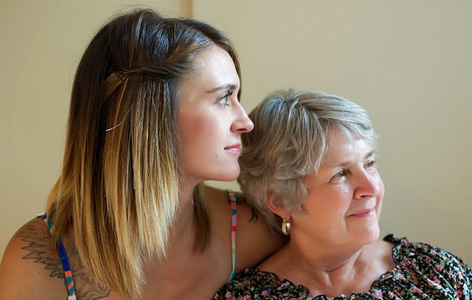
Radiation therapy provided no benefit for women over age 60 on hormone therapy with luminal A subtype breast cancer
Previous studies have shown that radiation therapy is of overall benefit for women after breast conserving surgery. However, the degree of benefit depends on various factors, including the aggressiveness of the cancer and the age of patient. This has led to the idea that, for some women, radiation therapy may be unnecessary.
To explore this idea, PM Senior Scientist and Clinician Dr. Fei-Fei Liu and Clinician Researcher Dr. Anthony Fyles analysed breast cancer samples from women on hormone therapy (tamoxifen). Half of these women were treated with radiation therapy, while the other half received no radiation. Molecular analyses were then conducted on their breast cancer samples to categorize them into four major breast cancer subtypes. The results revealed that women with the least aggressive subtype—known as luminal A breast cancer—benefitted the least from radiation therapy.
When the researchers only considered women over age 60 with luminal A subtype, they found that radiation therapy showed no benefit. For these women, only 1.3% experienced a recurrence without radiation therapy versus 5.0% when radiation therapy was administered.
These findings have led to the launch of a new clinical trial, sponsored by the Ontario Clinical Oncology Group, that will enroll 500 participants across Canada over three years. Dr. Fyles comments, "These results could lead to changes in clinical practice that would help minimize unnecessary treatment and side effects in up to a quarter of all women with breast cancer, and save as much as $3 million dollars annually for the province of Ontario. Post-menopausal women aged 55 or older with small node negative breast cancer who are interested in participating in the new trial should ask their treating physician if they are eligible for this study."
Supported by the Canadian Institutes of Health Research, the Giovanni And Concetta Guglietti Family Foundation, The Princess Margaret Cancer Foundation, the Campbell Family Institute for Cancer Research, and the Ontario Ministry of Health and Long-Term Care.
Identification of a Low-Risk luminal A breast cancer cohort that may not benefit from breast radiotherapy. Liu FF, Shi W, Done SJ, Miller N, Pintilie M, Voduc D, Nielsen TO, Nofech-Mozes S, Chang MC, Whelan TJ, Weir LM, Olivotto IA, McCready DR, Fyles AW. Journal of Clinical Oncology. 2015 May 11. [Pubmed abstract]




